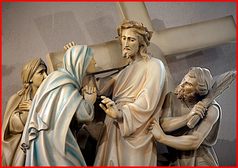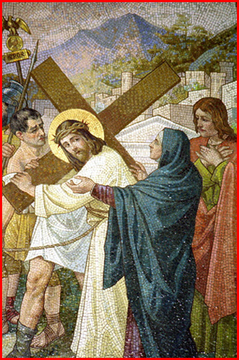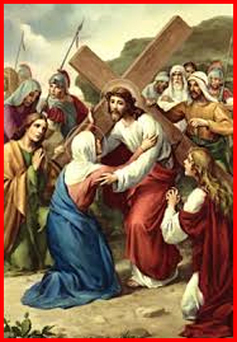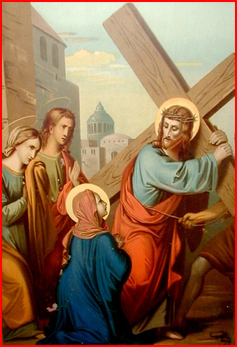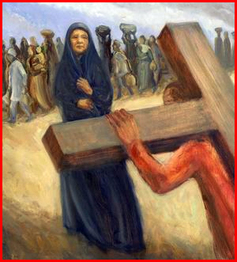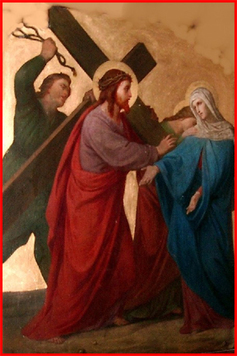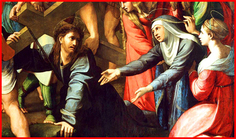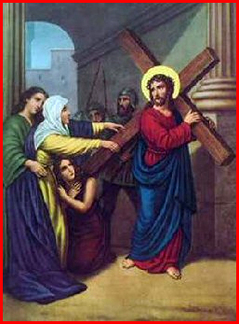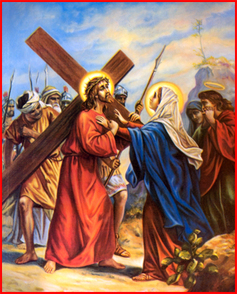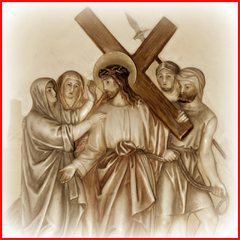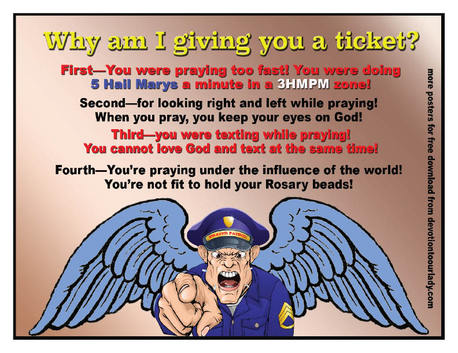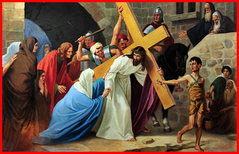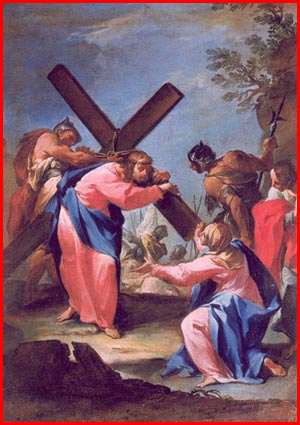| Devotion to Our Lady |
|
- Homepage
-
Daily Thoughts
- 2023 October Daily Thoughts
- Daily Thoughts Lent 2020
- Daily Thoughts for Advent 2019
- Daily Thoughts for October 2019
- Daily Thoughts for September 2019
- Daily Thoughts for August 2019
- Daily Thoughts for July
- Daily Thoughts for June
- Daily Thoughts for Easter 2019
- Daily Thoughts for Lent 2019
- Daily Thoughts for Christmas
- Daily Thoughts Easter 2022
- Sacred Heart
- Consecration
-
Spiritual Life
- Holy Mass Explained
- First Friday Devotions
- First Saturday Devotions
- The Mercy of God
- Vocations
- The Path Everyone Must Walk >
- Gift of Failure
- Halloween or Hell-O-Ween?
- Ignatian Spiritual Exercises >
- Meditation is Soul-Saving
- Spiritual Communion
- Miraculous Medal
- Enrollment in Miraculous Medal
- St. Benedict Medal
- Holy Water
- Advice on Prayer
- Your Daily Mary
-
Prayers
- September Devotions
- Seven Sorrows of Our Lady
-
Novenas
>
- NV-Help of Christians
- NV-Nativity of Our Lady
- NV-Seven Sorrows
- NV- Sorrowful Heart
- NV-Pope St Pius X
- NV-La Salette
- NV-St Michael Archangel
- NV-Immaculate Heart
- NV-Assumption
- NV-Novena for Fathers
- NV-Novena for Your Mother
- NV-St Raphael Archangel
- NV-Souls in Purgatory
- NV-All Saints Day
- NV-Christ the King
- NV-Divine Motherhood
- NV-Guardian Angels
- NV-Rosary
- NV-Mirac Med
- NV- Imm Conc
- NV - Guadalupe
- NV - Nativity of Jesus
- NV-Epiphany
- NV-OL Good Success
- NV-Lourdes
- NV-St Patrick
- NV-St Joseph
- NV-Annunciation
- NV-St Louis de Montfort
- NV-OL Good Counsel
- NV-Last Supper
- NV-Passion
- NV-Pentecost
- NV-Ascension
- NV-Sacred Heart
- NV-Sacred Heart & Perpetual Help
- NV-Corpus Christi
- NV-OL of Perpetual Help
- NV-Queenship BVM
- NV-OL of Mount Carmel
- NV-St Mary Magdalen
- NV- Im Hrt
- August Devotions to IHM
- Immaculate Heart of Mary
- Litany of Dependence
- Prayers to St Mary Magdalen
- Prayers in Times of Sickness Disease & Danger
- Holy Souls in Purgatory
- Meditations on the Litany of Our Lady
- Special Feast Days
- Prayers to Mary (Mon-Sun)
- Litanies to Our Lady >
- Various & Special Needs
- Our Lady of the Rosary
- Our Lady of Mt. Carmel
- Our Lady of Perpetual Help
- Our Lady of Guadalupe
- Other titles of Our Lady
-
Rosary
- Downloads
- Easter Season
-
Holy Week
- Last Seven Words of Jesus >
- Characters of Passion >
- The Last Days of Christ
- Before Palm Sunday
- Palm Sunday
- Monday in Holy Week
- Tuesday in Holy Week
- Wednesday in Holy Week
- Holy Thursday (Last Supper)
- Holy Thursday (Agony & Arrest)
- Night Vigil with Christ
- Good Friday (Pilate & Herod)
- Good Friday (Way of Cross & Crucifixion)
- Saturday in Holy Week
-
Lent
- Ideas for Lent
- Daily Lenten Planner
- Daily Lenten Liturgy
- From Cold to Hot
- Lent with Aquinas
- Lent with Dom Gueranger
- Virtues for Lent
- History of Penance
- How Expensive is Sin?
- Confession of Sins
- Letter to Friends of the Cross
- Sermons for Lent
- Stations of the Cross >
- Lenten Prayers
- 7 Penitential Psalms
- Lenten Psalms SUN
- Lenten Psalms MON
- Lenten Psalms TUE
- Lenten Psalms WED
- Lenten Psalms THU
- Lenten Psalms FRI
- Lenten Psalms SAT
- Lenten Laughs
- Septuagesima
-
Christmas
- Epiphany Explained
- Suggestions for Christmas
- Food For Thought
- Christmas with Aquinas
- Christmas with Dom Gueranger
- Christmas Prayers
- Candles & Candlemas
- Christmas Sermons
- Christmas Prayers SUN
- Christmas Prayers MON
- Christmas Prayers TUE
- Christmas Prayers WED
- Christmas Prayers THU
- Christmas Prayers FRI
- Christmas Prayers SAT
- Twelve Days of Christmas >
-
Advent Journey
- Purgatory
- Christ the King
- Legion of Mary
- Scapular
-
Saints
-
Martyrs for the Faith
>
- Your Daily Martyr >
- All 365 Days of Martyrs
- Cristeros
- St Valentine & Valentine's Day
- Martyrs--Thomas Becket
- Martyrs--John the Apostle
- Holy Machabees
- Age of Martyrdom
- Carmelites of Compiegne
- Martyrs--Peter & Paul
- Martyrs--John the Baptist
- Martyrs--Andrew
- Martyrs--James the Great
- Martyrs--North American
- Martyrs--Seven Holy Sleepers
- Martyrs--Afra
- School of Martyrdom
- Martyrs--Christina
- Desert Saints >
- Saints for Sinners >
- Saints of Mary >
- History of All Saints Day
-
Martyrs for the Faith
>
- Precious Blood
- Holy Ghost
- Synod 2023
-
Catechism
- Catechism Lesson 1
- Catechism Lesson 2
- Catechism Lesson 3
- Catechism Lesson 4
- Catechism Lesson 5
- Catechism Lesson 6
- Catechism Lesson 7
- Catechism Lesson 8
- Catechism Lesson 9
- Catechism Lesson 10
- Catechism Lesson 11
- Catechism Lesson 12
- Catechism Lesson 13
- Catechism Lesson 14
- Catechism Lesson 15
- Catechism Lesson 16
- Catechism Lesson 17
- Catechism Lesson 18
- Catechism Lesson 19
- Catechism Lesson 20
- Catechism Lesson 21
- Catechism Lesson 22
- Bible Study
-
Calendar
- Miracles
- Apparitions
- Shrines
- Prophecies
- Angels Homepage
- Hell
-
Church Crisis
- Conspiracy Theories
- Amazon Synod 2019 >
- Liberalism & Modernism
- Modernism--Encyclical Pascendi
- Modernism & Children
- Modernism--Documents
- The Francis Pages
- Church Enemies on Francis
- Francis Quotes
- Amoris Laetitia Critique
- Danger of Ignorance (Pius X)
- Restore all In Christ (Pius X)
- Catholic Action (Pius X)
- Another TITANIC Disaster?
- The "Errors of Russia"
- CRISIS PRAYERS
- Election Novena 2024
- The Anger Room
- War Zone
- Life of Mary
- Spiritual Gym
- Stupidity
- Coronavirus and Catholicism
- History & Facts
- Books
- Catholic Family
- Children
- Daily Quiz
-
Novena Church & Pope
- Day 01 Church-Pope Novena
- Day 02 Church-Pope Novena
- Day 03 Church-Pope Novena
- Day 04 Church-Pope Novena
- Day 05 Church-Pope Novena
- Day 06 Church-Pope Novena
- Day 07 Church-Pope Novena
- Day 08 Church-Pope Novena
- Day 09 Church-Pope Novena
- Day 10 Church-Pope Novena
- Day 11 Church-Pope Novena
- Day 12 Church-Pope Novena
- Day 13 Church-Pope Novena
- Day 14 Church-Pope Novena
- Day 15 Church-Pope Novena
- Day 16 Church-Pope Novena
- Day 17 Church-Pope Novena
- Day 18 Church-Pope Novena
- Day 19 Church-Pope Novena
- Day 20 Church-Pope Novena
- Day 21 Church-Pope Novena
- Day 22 Church-Pope Novena
- Day 23 Church-Pope Novena
- Day 24 Church-Pope Novena
- Day 25 Church-Pope Novena
- Day 26 Church-Pope Novena
- Day 27 Church-Pope Novena
- Day 28 Church-Pope Novena
- Day 29 Church-Pope Novena
- Day 30 Church-Pope Novena
- Day 31 Church-Pope Novena
- Day 32 Church-Pope Novena
- Day 33 Church-Pope Novena
- Day 34 Church-Pope Novena
- Day 35 Church-Pope Novena
- Day 36 Church-Pope Novena
- Day 37 Church-Pope Novena
- Day 38 Church-Pope Novena
- Day 39 Church-Pope Novena
- Day 40 Church-Pope Novena
- Day 41 Church-Pope Novena
- Day 42 Church-Pope Novena
- Day 43 Church-Pope Novena
- Day 44 Church-Pope Novena
- Day 45 Church-Pope Novena
- Day 46 Church-Pope Novena
- Day 47 Church-Pope Novena
- Day 48 Church-Pope Novena
- Day 49 Church-Pope Novena
- Day 50 Church-Pope Novena
- Day 51 Church-Pope Novena
- Day 52 Church-Pope Novena
- Day 53 Church-Pope Novena
- Day 54 Church-Pope Novena
- Penance Novena
- Daily WeAtheR Forecast
| 1st Station | 2nd Station | 3rd Station | 4th Station | 5th Station | 6th Station | 7th Station |
| 8th Station | 9th Station | 10th Station | 11th Station | 12th Station | 13th Station | 14th Station |
| 8th Station | 9th Station | 10th Station | 11th Station | 12th Station | 13th Station | 14th Station |
The Greatest and Most Important Time in the Church's Liturgical Year
CLICK ON ANY LINK BELOW
Also lots of LENTEN & HOLY WEEK DOWNLOADS on the downloads page (click here)
LENTEN PAGES
| ASH WEDNESDAY COUNTDOWN | LENT (MAIN PAGE) | DAILY THOUGHTS | DAILY LENTEN LITURGY | DAILY LENTEN PLANNER |
| LENTEN PRAYERS | THE 7 PENITENTIAL PSALMS | IDEAS FOR PENANCE | LENT WITH AQUINAS | LENT WITH DOM GUERANGER |
| HISTORY OF PENANCE | PENANCES OF THE SAINTS | HOW EXPENSIVE IS SIN? | CONFESSION OF SINS | ARE FEW SOULS SAVED? |
| VIRTUES FOR LENT | FROM COLD TO HOT | LENTEN LAUGHS | | SERMONS FOR LENT | LETTER TO FRIENDS OF THE CROSS |
| STATIONS OF THE CROSS (INDIVIDUALLY) | ALL 14 STATIONS OF THE CROSS | LITANIES FOR PASSIONTIDE |
| THE LAST DAYS OF CHRIST | SPECIAL HOLY WEEK PAGES |
LITURGICAL PRAYERS FOR EACH DAY OF THE WEEK DURING LENT
| Sundays of Lent | Mondays of Lent | Tuesdays of Lent | Wednesdays of Lent | Thursdays of Lent | Fridays of Lent | Saturdays of Lent |
HOLY WEEK PAGES
| Holy Week Main Page | Before Palm Sunday | Palm Sunday | The Last Days of Christ | Holy Thursday Last Supper Novena | Good Friday Passion Novena |
| Monday of Holy Week | Tuesday of Holy Week | Wednesday of Holy Week | Holy Thursday (Last Supper) | Holy Thursday (Agony & Arrest) |
| Night Vigil With Christ | Good Friday (Pilate & Herod) | Good Friday (Way of Cross & Crucifixion) | Holy Saturday |
THE CHIEF CHARACTERS OF THE PASSION
| Characters of the Passion Mainpage | The Sanhedrin | Pharisees | Scribes | Saducees | Jewish Crowd | Roman Rulers |
| Judas | Annas & Caiphas | Pontius Pilate | Herod | Barabbas | Dismas the Good Thief | St. Peter | St. John | Mary Magdalen |
THE FOURTEEN STATIONS OF THE CROSS
| Introduction to the Stations of the Cross | Short Version of the Stations of the Cross (all 14 on one page) | 1st Station | 2nd Station | 3rd Station |
| 4th Station | 5th Station | 6th Station | 7th Station | 8th Station | 9th Station | 10th Station | 11th Station | 12th Station | 13th Station | 14th Station |
THE LAST SEVEN WORDS OF JESUS FROM THE CROSS
| Seven Last Words on the Cross (Introduction) | The 1st Word on the Cross | The 2nd Word on the Cross | The 3rd Word on the Cross |
| The 4th Word on the Cross | The 5th Word on the Cross | The 6th Word on the Cross | The 7th Word on the Cross |
PRAYERS AND DEVOTIONS TO THE SEVEN SORROWS OF OUR LADY
| Seven Sorrows Meditations | Short Prayers & Short Seven Sorrows Rosary | Longer Seven Sorrows Rosary |
| 1st Sorrow of Our Lady | 2nd Sorrow of Our Lady | 3rd Sorrow of Our Lady | 4th Sorrow of Our Lady |
| 5th Sorrow of Our Lady | 6th Sorrow of Our Lady | 7th Sorrow of Our Lady |
| Novena #1 to the Sorrowful Heart of Mary | Novena #2 to the Sorrowful Heart of Mary |
CLICK ON ANY LINK BELOW
Also lots of LENTEN & HOLY WEEK DOWNLOADS on the downloads page (click here)
LENTEN PAGES
| ASH WEDNESDAY COUNTDOWN | LENT (MAIN PAGE) | DAILY THOUGHTS | DAILY LENTEN LITURGY | DAILY LENTEN PLANNER |
| LENTEN PRAYERS | THE 7 PENITENTIAL PSALMS | IDEAS FOR PENANCE | LENT WITH AQUINAS | LENT WITH DOM GUERANGER |
| HISTORY OF PENANCE | PENANCES OF THE SAINTS | HOW EXPENSIVE IS SIN? | CONFESSION OF SINS | ARE FEW SOULS SAVED? |
| VIRTUES FOR LENT | FROM COLD TO HOT | LENTEN LAUGHS | | SERMONS FOR LENT | LETTER TO FRIENDS OF THE CROSS |
| STATIONS OF THE CROSS (INDIVIDUALLY) | ALL 14 STATIONS OF THE CROSS | LITANIES FOR PASSIONTIDE |
| THE LAST DAYS OF CHRIST | SPECIAL HOLY WEEK PAGES |
LITURGICAL PRAYERS FOR EACH DAY OF THE WEEK DURING LENT
| Sundays of Lent | Mondays of Lent | Tuesdays of Lent | Wednesdays of Lent | Thursdays of Lent | Fridays of Lent | Saturdays of Lent |
HOLY WEEK PAGES
| Holy Week Main Page | Before Palm Sunday | Palm Sunday | The Last Days of Christ | Holy Thursday Last Supper Novena | Good Friday Passion Novena |
| Monday of Holy Week | Tuesday of Holy Week | Wednesday of Holy Week | Holy Thursday (Last Supper) | Holy Thursday (Agony & Arrest) |
| Night Vigil With Christ | Good Friday (Pilate & Herod) | Good Friday (Way of Cross & Crucifixion) | Holy Saturday |
THE CHIEF CHARACTERS OF THE PASSION
| Characters of the Passion Mainpage | The Sanhedrin | Pharisees | Scribes | Saducees | Jewish Crowd | Roman Rulers |
| Judas | Annas & Caiphas | Pontius Pilate | Herod | Barabbas | Dismas the Good Thief | St. Peter | St. John | Mary Magdalen |
THE FOURTEEN STATIONS OF THE CROSS
| Introduction to the Stations of the Cross | Short Version of the Stations of the Cross (all 14 on one page) | 1st Station | 2nd Station | 3rd Station |
| 4th Station | 5th Station | 6th Station | 7th Station | 8th Station | 9th Station | 10th Station | 11th Station | 12th Station | 13th Station | 14th Station |
THE LAST SEVEN WORDS OF JESUS FROM THE CROSS
| Seven Last Words on the Cross (Introduction) | The 1st Word on the Cross | The 2nd Word on the Cross | The 3rd Word on the Cross |
| The 4th Word on the Cross | The 5th Word on the Cross | The 6th Word on the Cross | The 7th Word on the Cross |
PRAYERS AND DEVOTIONS TO THE SEVEN SORROWS OF OUR LADY
| Seven Sorrows Meditations | Short Prayers & Short Seven Sorrows Rosary | Longer Seven Sorrows Rosary |
| 1st Sorrow of Our Lady | 2nd Sorrow of Our Lady | 3rd Sorrow of Our Lady | 4th Sorrow of Our Lady |
| 5th Sorrow of Our Lady | 6th Sorrow of Our Lady | 7th Sorrow of Our Lady |
| Novena #1 to the Sorrowful Heart of Mary | Novena #2 to the Sorrowful Heart of Mary |
THE FOURTH STATION : JESUS MEETS HIS HOLY MOTHER
“St. Augustine assures us that there is no spiritual exercise more fruitful or more useful than the frequent reflection on the sufferings of Our Lord. St. Albert the Great, who had St. Thomas Aquinas as his student, learned in a revelation that by simply thinking of or meditating on the Passion of Jesus Christ, a Christian gains more merit than if he had fasted on bread and water every Friday for a year, or had beaten himself with the discipline once a week till blood flowed, or had recited the whole Book of Psalms every day” (The Secret of the Rosary, St. Louis Marie de Montfort, “Twenty-Eighth Rose”).
|
From the house of Pilate the sorrowful and stricken Mother followed with the multitudes on the way of her divine Son, accompanied by Saint John and the pious women. As the surging crowds hindered her from getting very near to the Lord, She asked the eternal Father to be permitted to stand at the foot of the Cross of her blessed Son and see Him die with her own eyes. With the divine consent she ordered her holy angels to manage things in such a way as to make it possible for her to execute her wishes. The holy angels obeyed her with great reverence; and they speedily led the Queen through some side streets, in order that she might meet her Son.
Thus it came that both of them met face to face in sweetest recognition of each Other and in mutual renewal of each other's interior sorrows. Yet they did not speak to one another, nor would the fierce cruelty of the executioners have permitted such an intercourse. But the most prudent Mother adored her divine Son and true God, laden with the Cross; and interiorly besought Him, that, since She could not relieve Him of the weight of the Cross and since She was not permitted to command her holy angels to lighten it, He would inspire these ministers of cruelty to procure someone for his assistance. This prayer would be later heard by the Lord Christ; and it would be further along the way that Simon of Cyrene was later made to carry the Cross with the Lord (Matthew 27:32). The Pharisees and the executioners were afraid that Christ, the Author of life, should lose His life by exhaustion before it could be taken from Him on the Cross. Beyond all human thought and estimation was the sorrow of the Virgin Mother while she thus witnessed with her own eyes her Son carrying the Cross to Mount Calvary; for she alone could fittingly know and love Him according to his true worth. It would have been impossible for her to live through this ordeal, if the divine power had not strengthened her and preserved her life. With bitterest sorrow she addressed the Lord and spoke to Him in her heart: "My Son and eternal God, light of my eyes and life of my soul, receive, O Lord, the sacrifice of my not being able to relieve Thee of the burden of the Cross and carry it myself, who am a daughter of Adam; for it is I who should die upon it in love of Thee, as Thou now wishest to die in most ardent love of the human race. O most loving Mediator between guilt and justice! How dost Thou cherish mercy in the midst of so great injuries and such heinous offenses! O charity without measure or bounds, which permits such torments and affronts in order to afford it a wider scope for its ardor and efficacy! O infinite and sweetest love, would that the hearts and the wills of men were all mine, so that they could give no such thankless return for all that Thou endurest! O who will speak to the hearts of the mortals to teach them what they owe to Thee, since Thou hast paid so dearly for their salvation from ruin!" Other most prudent and exalted sentiments besides these were conceived by the great Lady, so that I cannot express them by words of mine. THOUGHTS OF ST. ALPHONSUS LIGOURI ON THE MEETING St. Bernadine says, that to form an idea of the grief of Mary in losing her Jesus by death, it is necessary to consider the love that this mother bore to this her Son. All mothers feel the sufferings of their children as their own. Hence the woman of Chanaan, when she prayed the Savior to deliver her daughter from the devil that tormented her, said to Him, that He should have pity on the mother rather than on the daughter: “Have mercy on me, O Lord, Thou son of David, my daughter is grievously troubled by a devil!” But what mother ever loved a child so much as Mary loved Jesus? He was her only child, reared amidst so many troubles and pains; a most amiable Child, and most loving to His mother; a Son, who was at the same time her Son and her God; who came on earth to kindle in the hearts of all the holy fire of divine love, as he himself declared: “I am come to cast fire on the earth, and what will I but that it be kindled?” Let us consider how He must have inflamed that pure heart of His holy mother, so free from every earthly affection. In a word, the Blessed Virgin herself said to St. Bridget, that through love her heart and the heart of her Son was one. That blending of hand maid and mother, of Son and God, kindled in the Heart of Mary afire composed of a thousand flames. But afterwards, at the time of the Passion, this flame of love was changed into a sea of sorrow. Hence St. Bernardine says: “All the sorrows of the world united would not be equal to the sorrow of the glorious Mary.” Yes, because this Mother, as St. Lawrence Justinian writes: “The more tenderly she loved, was the more deeply wounded.” The greater the tenderness with which she loved Him, the greater was her grief at the sight of His sufferings, especially when she met her Son, after He had already been condemned, going to death at the place of punishment, bearing the cross. And this is the sorrow which today we have to consider. The Blessed Virgin revealed to St. Bridget that at the time when the Passion of Our Lord was drawing nigh, her eyes were always filled with tears, as she thought of her beloved Son whom she was about to lose on this earth. Therefore, as she also said, a cold sweat covered her body from the fear that seized her at that prospect of approaching suffering. “Behold, the pointed day at length arrived, and Jesus came in tears to take leave of His mother before He went to death. St. Bonaventure, contemplating Mary on that night, says: “Thou didst spend it without sleep, and while others slept, thou didst remain watching.” Morning having arrived the disciples of Jesus Christ came to this afflicted mother, one, to bring her this tidings, another, that; but all tidings of sorrow, for in her were then verified the words of Jeremias: “Weeping, she hath wept in the night, and her tears are on her cheeks; there is none to comfort her of all them that were dear to her.” One came to relate to her the cruel treatment of her Son in the house of Caiphas; another, the insults received by Him from Herod. Finally, we omit the rest to come to the point, St. John came and announced to Mary that the most unjust Pilate had already condemned Him to death upon the cross. We say the most unjust, for, as Pope St. Leo the Great remarks, this unjust judge condemned Him to death with the same lips with which he had pronounced him innocent. Ah, sorrowful mother; said St. John to her, thy Son has already been condemned to death, He is already on His way, bearing, by Himself, His cross on His way to Calvary, as he afterwards related in his Gospel: “And bearing His own cross, He went forth to that place which is called Calvary.” Come, if thou dost desire to see Him and bid him a last farewell in some of the streets through which He is to pass. Mary goes with St. John, and she perceives by the blood with which the way was sprinkled, that her Son had already passed there. This she revealed to St. Bridget: “By the footsteps of my Son I traced His course, for along the way by which He had passed, the ground was sprinkled with blood.” St. Bonaventure imagines the afflicted mother taking a shorter way, and placing herself at the corner of the street to meet her afflicted Son as He passed by. This most afflicted mother met her most afflicted Son, said St. Bernard. While Mary stopped in that place how much she must have heard said against her Son by the Jews who knew her, and perhaps also words in mockery of herself! Alas, what a commencement of sorrows was then before her eyes, when she saw the nails, the hammers, the cords, the fatal instruments of the death of her Son borne before Him! And what a sword pierced her heart when she heard the trumpet proclaiming along the way the sentence pronounced against her Son! But behold, now, after the instruments, the trumpet, and the ministers of justice had passed, she raises her eyes and sees; she sees, O God, a young man covered with blood and wounds from head to foot, with a crown of thorns on His head, and two heavy beams on His shoulders; she looks at Him and hardly knows Him, saying, then, with Isaias: “And we have seen him, and there was no sightliness.” Yes, for the wounds, the bruises, and clotted blood, made Him look like a leper; “We have thought him, as it were, a leper” so that He could no longer be recognized. “And His look was, as it were, hidden and despised, whereupon we esteemed Him not.” But at length love recognizes Him, and as soon as she knows Him, ah, what was then, as St. Peter of Alcantara says in his meditations, the love and fear of the heart of Mary! On the one hand, she desired to see Him; on the other, she could not endure to look upon so pitiable a sight. But at length they look at each other. The Son wipes from His eyes the clotted blood, which prevented Him from seeing (as was revealed to St. Bridget), and looks upon the mother; the mother looks upon the Son. Ah, looks of sorrow, which pierced, as with so many arrows, those two holy and loving souls. When Margaret, the daughter of Sir Thomas More, met her father on his way to the scaffold, she could utter only two words, “OhH, father! Oh, father!” and fell fainting at his feet. At the sight of her Son going to Calvary, Mary fainted not; no, because it was not fitting that His mother should lose the use of her reason, as Father Suarez remarks, neither did she die, for God reserved her for a greater grief; but if she did not die, she suffered sorrow enough to cause her a thousand deaths. The Mother wished to embrace Him, as St. Anselm says, but the officers of justice thrust her aside, loading her with insults, and urge on ward our afflicted Lord. Mary follows. Ah, Holy Virgin, where art thou going? To Calvary! And canst thou trust thyself to see Him who is thy life hanging from a cross? And thy life shall be as it were hanging before thee. “Ah, my mother, stop!” says St. Lawrence Justinian, as if the Son Himself had then spoken to her; “where dost thou hasten? Where art thou going? If thou comest where I go, thou wilt be tortured with my sufferings, and I with thine.” But although the sight of her dying Jesus must cost her such cruel anguish, the loving Mary will not leave him. The Son goes before, and the mother follows, that she may be crucified with her Son, as William the Abbot says: “The mother took up her cross, and followed Him, that she might be crucified with Him.” We even pity the wild beasts, as St. John Chrysostom has said. If we should see a lioness following her whelp as he was led to death, even this wild beast would call forth our compassion. And shall we not feel compassion to see Mary following her Immaculate Lamb, as they are leading Him to death ? Let us then pity her, and endeavor also ourselves to accompany her Son and herself, bearing with patience the cross which the Lord imposes upon us. Why did Jesus Christ, asks St. John Chrysostom, desire to be alone in His other sufferings, but in bearing the cross wished to be helped by the Cyrenean ? And he answers: “That thou mayest understand that the cross of Christ is not sufficient without thine.” The cross alone of Jesus is not enough to save us, if we do not bear with resignation also our own, even unto death. INSTRUCTION GIVEN BY OUR LADY TO THE VENERABLE MARY OF AGREDA I desire that the fruit of the obedience with which thou writest the history of my life shall be, that thou become a true disciple of my most holy Son and of myself. The main purpose of the exalted and venerable mysteries, which are made known to thee, and of the teachings, which I so often repeat to thee, is that thou deny and strip thyself, estranging thy heart from all affection to creatures, neither wishing to possess them nor accept them for other uses. By this precaution thou wilt overcome the impediments, which the devils seek to place in the way of the dangerous softness of thy nature. I who know thee, thus advise and lead thee by the way of instruction and correction as thy Mother and Instructress. By the divine teaching thou knowest the mysteries of the Passion and Death of Christ and the one true way of life, which is the Cross; and thou knowest that not all who are called, are chosen. Many there are who wish to follow Christ and very few who truly dispose themselves to imitate Him; for as soon as they feel the sufferings of the Cross they cast it aside. Laborious exertions are very painful and averse to human nature according to the flesh; and the fruits of the spirit are more hidden and few guide themselves by the light. On this account there are so many among mortals, who, forgetful of the eternal truths, seek the flesh and the continual indulgence of its pleasures. They ardently seek honors and fly from injuries: they strive after riches, and contemn poverty; they long after pleasure and dread mortification. All these are enemies of the Cross of Christ (Philippians 3:18), and with dreadful aversion they fly from it, deeming it sheer ignominy, just like those who crucified Christ, the Lord. Another deceit has spread through the world: many imagine that they are following Christ their Master, though they neither suffer affliction nor engage in any exertion or labor. They are content with avoiding boldness in committing sins, and place all their perfection in a certain prudence or hollow self-love, which prevents them from denying anything to their will and from practicing any virtues at the cost of their flesh. They would easily escape this deception, if they would consider that my Son was not only the Redeemer, but their Teacher; and that He left in this world the treasures of his Redemption not only as a remedy against its eternal ruin, but as a necessary medicine for the sickness of sin in human nature. No one knew so much as my Son and Lord; no one could better understand the quality of love than the divine Lord, who was and is wisdom and charity itself; and no one was more able to fulfill all his wishes (1 John 4:16). Nevertheless, although He well could do it, He chose not a life of softness and ease for the flesh, but one full of labors and pains; for He judged his instructions to be incomplete and insufficient to redeem man, if He failed to teach them how to overcome the demon, the flesh and their own self. He wished to inculcate, that this magnificent victory is gained by the Cross, by labors, penances, mortifications and the acceptance of contempt: all of which are the trade-marks and evidences of true love and the special watchwords of the predestined. Thou, my daughter, knowest the value of the holy Cross and the honor which it confers upon ignominies and tribulations; do thou embrace the Cross and bear it with joy in imitation of my Son and thy Master (Matthew 16:24). In this mortal life let thy glory be in tribulations, persecutions (Romans 5:3), contempt, infirmities, poverty, humiliation and in whatever is painful and averse to mortal flesh. And in order that in all thy exercises thou mayest imitate me and give me pleasure, I wish that thou seek no rest or consolation in any earthly thing. Thou must not dwell in thy thoughts upon what thou bearest, nor seek to relieve thyself by enlisting the compassion of others. Much less must thou make much of, or try to impress others with the recital of the persecutions or molestation of creatures, nor should it ever be heard from thy lips, how much thou endurest, nor shouldst thou compare thy sufferings with those of others. I do not wish to say, that it is a sin to accept of some reasonable and moderate alleviation, or to mention thy afflictions. But in thee, my dearest, much alleviation, if not a sin, would be an infidelity to thy Spouse and Lord; for He has put thee personally under more obligation than many generations of men and thy response in suffering and love will be defective and wanting, if it is not complete and loyal in all respects. So faithful does the Lord wish thy correspondence to be, that thou must allow thy weak nature not even one sigh for mere natural relief and consolation. If love alone impels thee, thou wilt allow thyself to be carried along by its sweet force and rest in it alone; and the love of the Cross would immediately dispense with such natural relief, in the same way as thou knowest I have done in my total self-sacrifice. Let this be to thee a general rule: that all human consolation is an imperfection and a danger, and that thou shouldst welcome only that, which the Most High sends to thee Himself or through his holy angels. And even these favors of the divine right hand thou must accept only in so far as they strengthen thee to suffer more constantly and to withdraw thee from all that ministers to the senses. CONCLUDING MEDITATION AND PRAYER V. We adore Thee, O Christ, and we praise Thee, R.. Because by Thy holy cross Thou hast redeemed the world. MEDITATION Wherever there is Mary, there too is Jesus. Wherever there is Jesus, there too is the Cross. Mary's life was also one of the Cross. Already at the Presentation of the Infant Jesus in the Temple, St. Simeon prophesied about Mary's Cross, saying: "And your own soul a sword shall pierce." In this Age of Mary, Heaven has made it clear that God wants Our Lady to be honored not only by the title of "Immaculate Heart", but that of the "Sorrowful and Immaculate Heart". Mary's sorrows were a mystical martyrdom. She never shirked the Cross, ever repeating in spirit those words she had first uttered to the Angel Gabriel at the Annunciation: "Be it done unto me according to thy word." At Fatima she echoed the need of the Cross when she said that Heaven required much prayer and sacrifices for the salvation of sinners, adding that many were damned because there was nobody to pray and offer sacrifices for them. Both Our Lord and Our Lady offered the supreme sacrifice for our salvation, let us add our own Crosses as sacrifices for the salvation of others. And as Mary stood by her Son until his death, let us ask to stand by us, "now and at the hour of our death." PRAYER O Jesus, O Mary, I am the cause of the great and manifold pains which pierce your loving hearts! Oh, that also my heart would feel and experience at least some of your sufferings! O Mother of Sorrows, let me participate in the sufferings which thou and Thy Son endured for me, and let me experience thy sorrow, that afflicted with thee, I may enjoy thy assistance in the hour of my death. Our Father. Hail Mary. Glory Be. V. Lord Jesus, crucified, R. Have mercy on us! |
Web Hosting by Just Host

